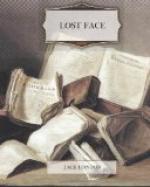For two days he ate nothing. Then, drifting into the Yukon Flats, he went ashore on the low-lying islands and gathered the eggs of wild geese and ducks. He had no matches, and ate the eggs raw. They were strong, but they kept him going. When he crossed the Arctic Circle, he found the Hudson Bay Company’s post. The brigade had not yet arrived from the Mackenzie, and the post was completely out of grub. He was offered wild-duck eggs, but he informed them that he had a bushel of the same on the boat. He was also offered a drink of whisky, which he refused with an exhibition of violent repugnance. He got matches, however, and after that he cooked his eggs. Toward the mouth of the river head-winds delayed him, and he was twenty-four days on the egg diet. Unfortunately, while asleep he had drifted by both the missions of St. Paul and Holy Cross. And he could sincerely say, as he afterward did, that talk about missions on the Yukon was all humbug. There weren’t any missions, and he was the man to know.
Once on Bering Sea he exchanged the egg diet for seal diet, and he never could make up his mind which he liked least. In the fall of the year he was rescued by a United States revenue cutter, and the following winter he made quite a hit in San Francisco as a temperance lecturer. In this field he found his vocation. “Avoid the bottle” is his slogan and battle-cry. He manages subtly to convey the impression that in his own life a great disaster was wrought by the bottle. He has even mentioned the loss of a fortune that was caused by that hell-bait of the devil, but behind that incident his listeners feel the loom of some terrible and unguessed evil for which the bottle is responsible. He has made a success in his vocation, and has grown grey and respected in the crusade against strong drink. But on the Yukon the passing of Marcus O’Brien remains tradition. It is a mystery that ranks at par with the disappearance of Sir John Franklin.
THE WIT OF PORPORTUK
El-Soo had been a Mission girl. Her mother had died when she was very small, and Sister Alberta had plucked El-Soo as a brand from the burning, one summer day, and carried her away to Holy Cross Mission and dedicated her to God. El-Soo was a full-blooded Indian, yet she exceeded all the half-breed and quarter-breed girls. Never had the good sisters dealt with a girl so adaptable and at the same time so spirited.
El-Soo was quick, and deft, and intelligent; but above all she was fire, the living flame of life, a blaze of personality that was compounded of will, sweetness, and daring. Her father was a chief, and his blood ran in her veins. Obedience, on the part of El-Soo, was a matter of terms and arrangement. She had a passion for equity, and perhaps it was because of this that she excelled in mathematics.
But she excelled in other things. She learned to read and write English as no girl had ever learned in the Mission. She led the girls in singing, and into song she carried her sense of equity. She was an artist, and the fire of her flowed toward creation. Had she from birth enjoyed a more favourable environment, she would have made literature or music.




